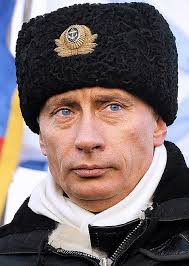“I Think President Putin Represents A Deep Strain In Russia That Is Probably Harmful To Russia Over The Long Term”
August 3, 2014 in Excerpts, Politics, Science/Tech, Urban Studies | Permalink
When Vladimir Putin went aggressive with Ukraine, he was heralded by some in this country as appearing “strong” and President Obama as seeming “weak,” although you’d have to be pretty simple to view things that way. Putin was sticking his foot in it but good–his ass, too–becoming ensnared in a quagmire the way the U.S. did when invading Iraq, leaving himself wide open for things to career out of control (like MH-17 being shot down). Putin was a 20th-century leader adrift in the 21-st century, a visitor from the past trying to commandeer the future, and that never turns out well.
One passage from the new long-form Economist interview with Obama, which focuses on his dealings with Russia and China:
“The Economist:
Because that is the key issue, whether China ends up inside that system or challenging it. That’s the really big issue of our times, I think.
President Obama:
It is. And I think it’s important for the United States and Europe to continue to welcome China as a full partner in these international norms. It’s important for us to recognise that there are going to be times where there are tensions and conflicts. But I think those are manageable.
And it’s my belief that as China shifts its economy away from simply being the low-cost manufacturer of the world to wanting to move up the value chain, then suddenly issues like protecting intellectual property become more relevant to their companies, not just to US companies.
One thing I will say about China, though, is you also have to be pretty firm with them, because they will push as hard as they can until they meet resistance. They’re not sentimental, and they are not interested in abstractions. And so simple appeals to international norms are insufficient. There have to be mechanisms both to be tough with them when we think that they’re breaching international norms, but also to show them the potential benefits over the long term. And what is true for China then becomes an analogy for many of the other emerging markets.
The Economist:
What about the people who are just outright difficult? Russia being the obvious example at the moment. You tried to ‘reset’ with Russia. Angela Merkel spent the whole time telephoning Vladimir Putin. To what extent do you feel let down almost personally by what’s happened?
President Obama:
I don’t feel let down. We had a very productive relationship with President Medvedev. We got a lot of things done that we needed to get done. Russia I think has always had a Janus-like quality, both looking east and west, and I think President Putin represents a deep strain in Russia that is probably harmful to Russia over the long term, but in the short term can be politically popular at home and very troublesome abroad.
But I do think it’s important to keep perspective. Russia doesn’t make anything. Immigrants aren’t rushing to Moscow in search of opportunity. The life expectancy of the Russian male is around 60 years old. The population is shrinking. And so we have to respond with resolve in what are effectively regional challenges that Russia presents. We have to make sure that they don’t escalate where suddenly nuclear weapons are back in the discussion of foreign policy. And as long as we do that, then I think history is on our side.”
Tags: Barack Obama, Vladimir Putin
Subscribe to my free Substack newsletter, "Books I Read This Month." It's published on the final day of each month. Some new titles, some older, some rare.
Categories
About
Afflictor.com is the website of Darren D’Addario. Except where otherwise noted, all writing is his copyrighted material. ©2009-18.

